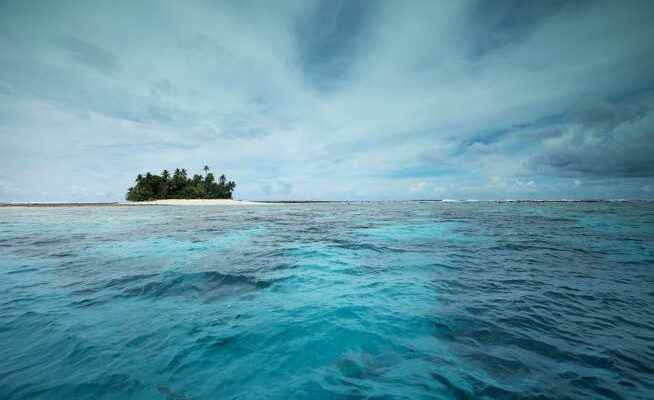Large parts of the Pacific state of Tuvalu are likely to become uninhabitable by the end of the century. The government now wants to create a virtual replica of the nation “to remind our children and grandchildren of what our homeland was like”.
A maximum of 4.6 meters above sea level and in danger of sinking: an island of Tuvalu in the Pacific.
Simon Kofe, the foreign minister of the island state of Tuvalu, stands on the beach and looks seriously into the camera. “As our country disappears, we have no choice but to become the world’s first digital nation,” he says. It is a video address by his government for the COP27 climate conference.
In Tuvalu it is rarely colder than 28 degrees, but Kofe still wears a suit and tie. The island he stands on is called Teafualiku. It may be one of the first to sink due to rising sea levels. Kofe has realized that he can no longer prevent this. That’s why he’s now looking for ways to make the inevitable more bearable.
“In order to preserve our country, our culture and thus the most valuable goods of our people, we will move them to the cloud,” says Kofe. The archipelago will be rebuilt “piece by piece” in a virtual reality “to give people comfort and to remind our children and grandchildren of what our homeland used to be like”.
Then the camera zooms out and shows the statesman standing on what appears to be a virtual island, the sand is white, the water is turquoise, the sky is black. Only global efforts could ensure that Tuvalu doesn’t have to go “permanently online” and “disappear from the physical plane forever,” says Kofe from the off.
It is not the first dramatic video speech from the archipelago. Last year, Kofe stood knee-deep in the sea for a speech about the COP26 climate summit and called for “bold measures to secure tomorrow”. That didn’t help, says Kofe. That’s why his country is now forced to go the way to the metaverse.
Clever marketing for a poor small country
Tuvalu is among the countries most affected by climate change. Even today, up to 40 percent of the main island is regularly flooded. Since the state’s highest point is 4.6 meters above sea level and researchers from the Intergovernmental Panel on Climate Change predict that the oceans will rise by between 28 and 101 centimeters by the end of the century, large parts of the archipelago are likely to become uninhabitable in the coming decades.
The government of Tuvalu must now show whether Kofe’s metaverse plans are more than skilful climate PR. So far, no country has been completely mapped in virtual reality. Even in the case of Tuvalu, the fourth smallest country in the world, this would require a great deal of effort, after all the state consists of 124 islands. Tuvalu would therefore need a large budget for the project.
However, the country desperately poor. Because it hardly attracts any tourists, it is one of the least developed archipelagos in the Pacific. Agriculture and fishing are the cornerstones of the economy, but both sectors are in crisis: fishing, because the sea temperature is rising and fish are migrating to waters further from the coast. Agriculture, because rising sea levels are salting crops and hurricanes that are becoming more frequent are destroying crops.
Sympathy points for development aid?
It can therefore be assumed that only very few of the approximately 11,000 inhabitants of Tuvalu deal with the metaverse. The government has failed to provide any concrete explanations as to how the transfer to virtual reality is envisaged, especially since the metaverse as a comprehensive platform does not yet exist.
One also shows that the government’s most recent promises are more about clever campaigning than a solid plan site, associated with the project. From there, interested parties can send standardized e-mails to the environmental officers in their state governments with just a few clicks, asking them to save Tuvalu.
This should not only make governments around the world aware of climate change, but also arouse sympathy for the small state. Although only about as many people live on the archipelago as in the Swiss mountain town of Davos, receives Tuvalu according to the World Bank international development aid in the amount of around 42 million dollars.
This shows that with the plans for the metaverse, the government is behaving towards its population in the same way as the world community is behaving towards the island state: support is given, but not that which those affected actually need.
